MK3S85 - Evaluating Coca Cola's Sustainable Business Management
VerifiedAdded on 2023/04/17
|14
|3633
|291
Essay
AI Summary
This essay discusses the role of business in addressing sustainability challenges, focusing on climate change, social justice, and economic prosperity. It critically evaluates the contribution of sustainable business practices and examines Coca-Cola's management of the triple bottom line, corporate social responsibility, and business ethics in Kenya. The analysis includes Coca-Cola's initiatives related to healthcare, safe working environments, community health programs, and environmental conservation efforts such as water conservation and emission reduction. The essay concludes that Coca-Cola's corporate citizenship activities significantly impact consumer perception and highlights the importance of integrating ethical practices into business operations for sustainable economic development.
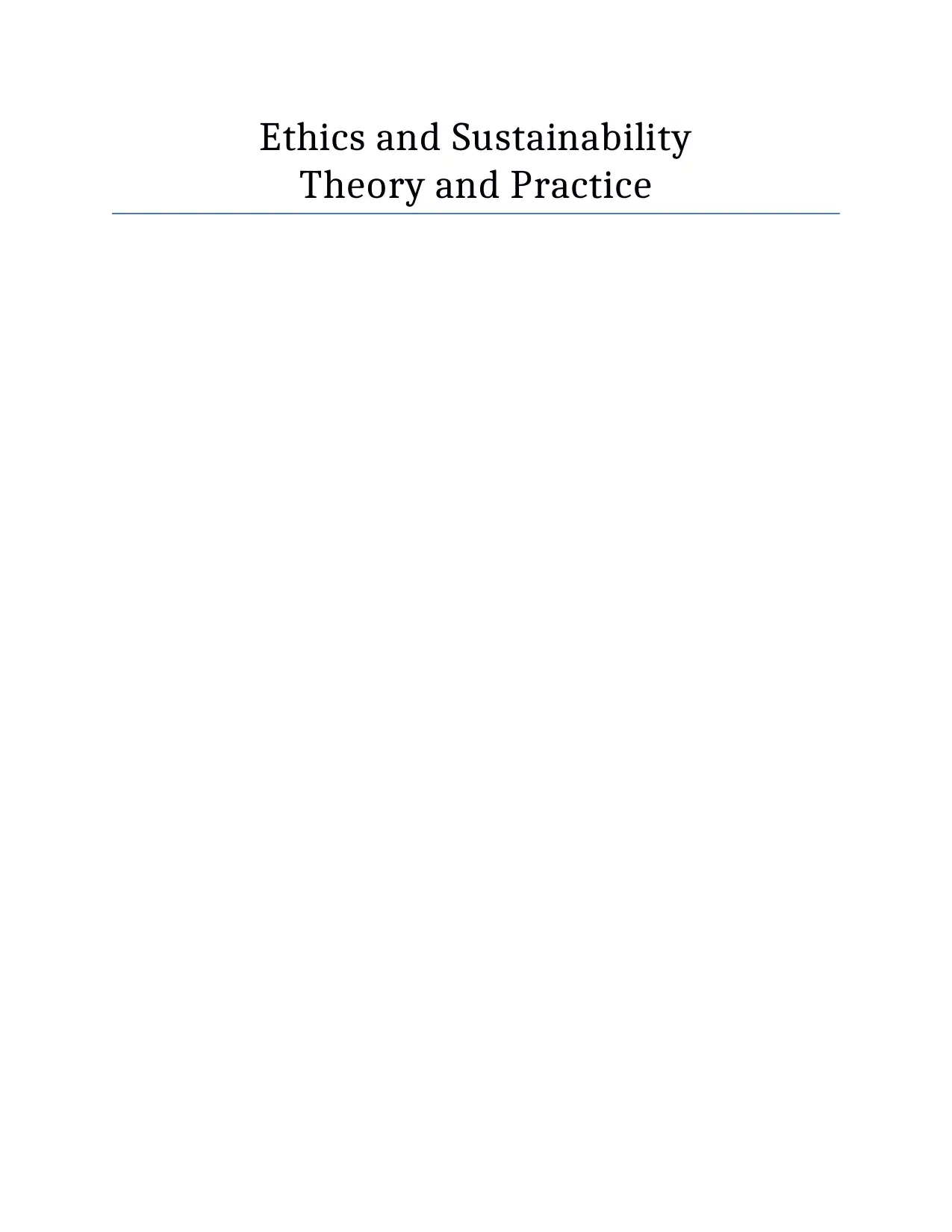
Ethics and Sustainability
Theory and Practice
Theory and Practice
Paraphrase This Document
Need a fresh take? Get an instant paraphrase of this document with our AI Paraphraser
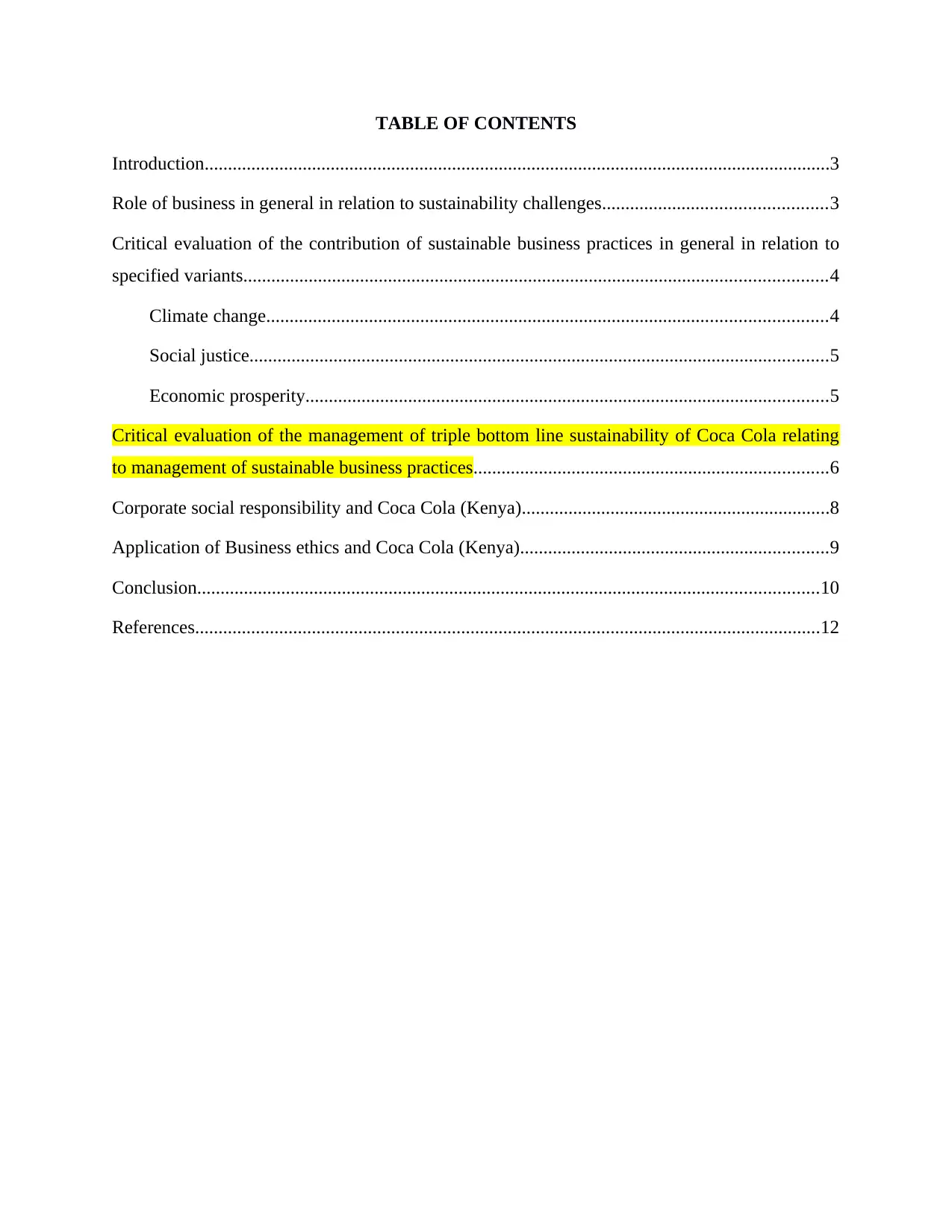
TABLE OF CONTENTS
Introduction......................................................................................................................................3
Role of business in general in relation to sustainability challenges................................................3
Critical evaluation of the contribution of sustainable business practices in general in relation to
specified variants.............................................................................................................................4
Climate change........................................................................................................................4
Social justice............................................................................................................................5
Economic prosperity................................................................................................................5
Critical evaluation of the management of triple bottom line sustainability of Coca Cola relating
to management of sustainable business practices............................................................................6
Corporate social responsibility and Coca Cola (Kenya)..................................................................8
Application of Business ethics and Coca Cola (Kenya)..................................................................9
Conclusion.....................................................................................................................................10
References......................................................................................................................................12
Introduction......................................................................................................................................3
Role of business in general in relation to sustainability challenges................................................3
Critical evaluation of the contribution of sustainable business practices in general in relation to
specified variants.............................................................................................................................4
Climate change........................................................................................................................4
Social justice............................................................................................................................5
Economic prosperity................................................................................................................5
Critical evaluation of the management of triple bottom line sustainability of Coca Cola relating
to management of sustainable business practices............................................................................6
Corporate social responsibility and Coca Cola (Kenya)..................................................................8
Application of Business ethics and Coca Cola (Kenya)..................................................................9
Conclusion.....................................................................................................................................10
References......................................................................................................................................12
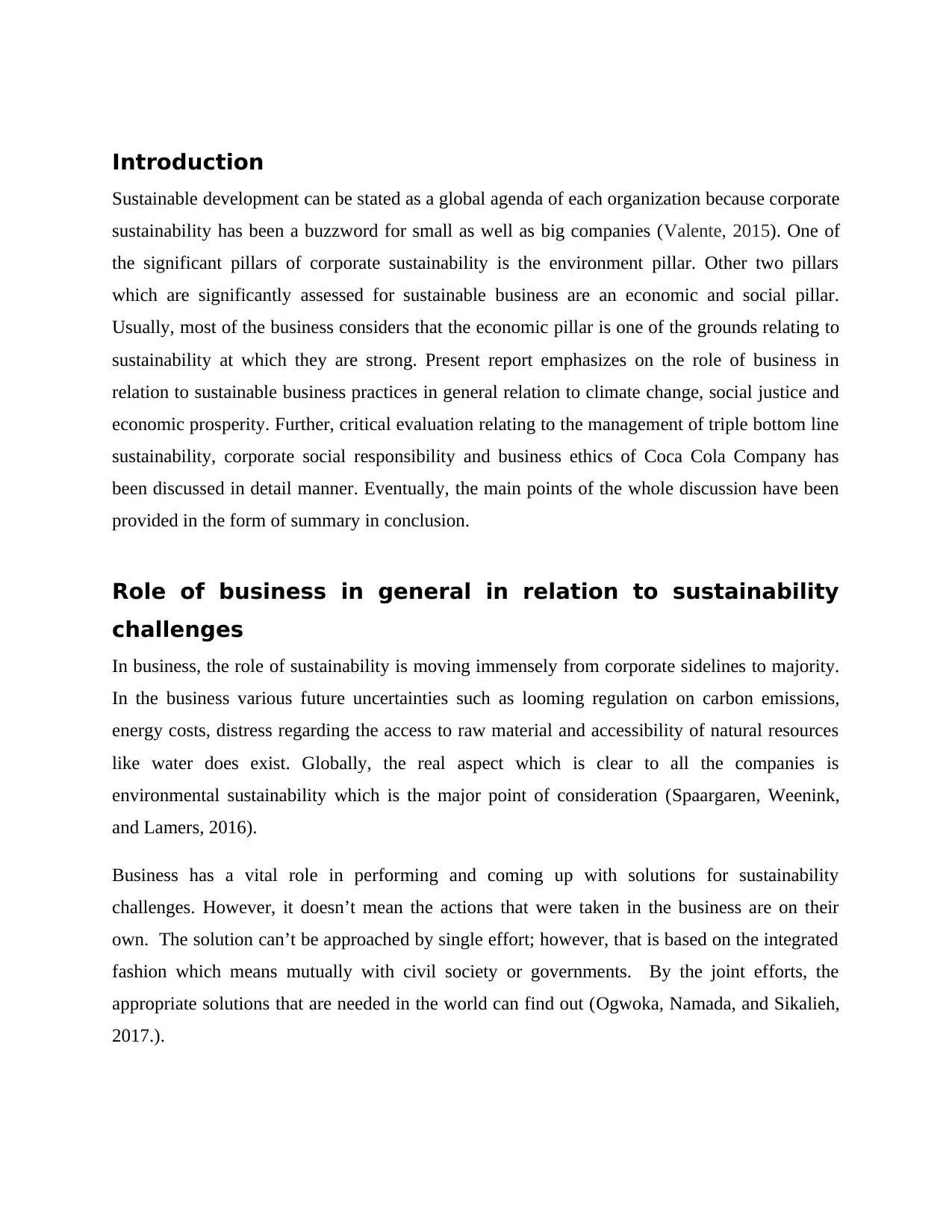
Introduction
Sustainable development can be stated as a global agenda of each organization because corporate
sustainability has been a buzzword for small as well as big companies (Valente, 2015). One of
the significant pillars of corporate sustainability is the environment pillar. Other two pillars
which are significantly assessed for sustainable business are an economic and social pillar.
Usually, most of the business considers that the economic pillar is one of the grounds relating to
sustainability at which they are strong. Present report emphasizes on the role of business in
relation to sustainable business practices in general relation to climate change, social justice and
economic prosperity. Further, critical evaluation relating to the management of triple bottom line
sustainability, corporate social responsibility and business ethics of Coca Cola Company has
been discussed in detail manner. Eventually, the main points of the whole discussion have been
provided in the form of summary in conclusion.
Role of business in general in relation to sustainability
challenges
In business, the role of sustainability is moving immensely from corporate sidelines to majority.
In the business various future uncertainties such as looming regulation on carbon emissions,
energy costs, distress regarding the access to raw material and accessibility of natural resources
like water does exist. Globally, the real aspect which is clear to all the companies is
environmental sustainability which is the major point of consideration (Spaargaren, Weenink,
and Lamers, 2016).
Business has a vital role in performing and coming up with solutions for sustainability
challenges. However, it doesn’t mean the actions that were taken in the business are on their
own. The solution can’t be approached by single effort; however, that is based on the integrated
fashion which means mutually with civil society or governments. By the joint efforts, the
appropriate solutions that are needed in the world can find out (Ogwoka, Namada, and Sikalieh,
2017.).
Sustainable development can be stated as a global agenda of each organization because corporate
sustainability has been a buzzword for small as well as big companies (Valente, 2015). One of
the significant pillars of corporate sustainability is the environment pillar. Other two pillars
which are significantly assessed for sustainable business are an economic and social pillar.
Usually, most of the business considers that the economic pillar is one of the grounds relating to
sustainability at which they are strong. Present report emphasizes on the role of business in
relation to sustainable business practices in general relation to climate change, social justice and
economic prosperity. Further, critical evaluation relating to the management of triple bottom line
sustainability, corporate social responsibility and business ethics of Coca Cola Company has
been discussed in detail manner. Eventually, the main points of the whole discussion have been
provided in the form of summary in conclusion.
Role of business in general in relation to sustainability
challenges
In business, the role of sustainability is moving immensely from corporate sidelines to majority.
In the business various future uncertainties such as looming regulation on carbon emissions,
energy costs, distress regarding the access to raw material and accessibility of natural resources
like water does exist. Globally, the real aspect which is clear to all the companies is
environmental sustainability which is the major point of consideration (Spaargaren, Weenink,
and Lamers, 2016).
Business has a vital role in performing and coming up with solutions for sustainability
challenges. However, it doesn’t mean the actions that were taken in the business are on their
own. The solution can’t be approached by single effort; however, that is based on the integrated
fashion which means mutually with civil society or governments. By the joint efforts, the
appropriate solutions that are needed in the world can find out (Ogwoka, Namada, and Sikalieh,
2017.).
⊘ This is a preview!⊘
Do you want full access?
Subscribe today to unlock all pages.

Trusted by 1+ million students worldwide
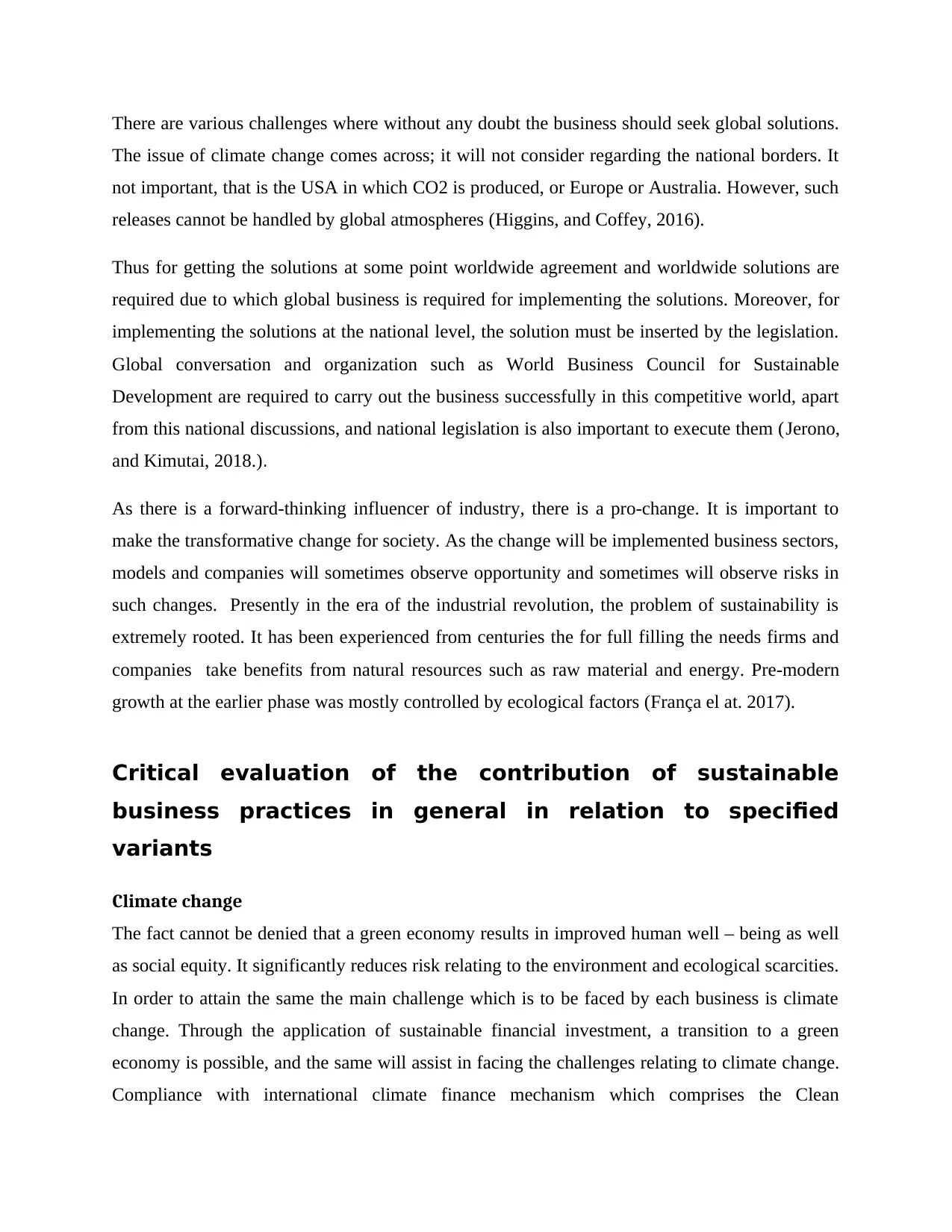
There are various challenges where without any doubt the business should seek global solutions.
The issue of climate change comes across; it will not consider regarding the national borders. It
not important, that is the USA in which CO2 is produced, or Europe or Australia. However, such
releases cannot be handled by global atmospheres (Higgins, and Coffey, 2016).
Thus for getting the solutions at some point worldwide agreement and worldwide solutions are
required due to which global business is required for implementing the solutions. Moreover, for
implementing the solutions at the national level, the solution must be inserted by the legislation.
Global conversation and organization such as World Business Council for Sustainable
Development are required to carry out the business successfully in this competitive world, apart
from this national discussions, and national legislation is also important to execute them (Jerono,
and Kimutai, 2018.).
As there is a forward-thinking influencer of industry, there is a pro-change. It is important to
make the transformative change for society. As the change will be implemented business sectors,
models and companies will sometimes observe opportunity and sometimes will observe risks in
such changes. Presently in the era of the industrial revolution, the problem of sustainability is
extremely rooted. It has been experienced from centuries the for full filling the needs firms and
companies take benefits from natural resources such as raw material and energy. Pre-modern
growth at the earlier phase was mostly controlled by ecological factors (França el at. 2017).
Critical evaluation of the contribution of sustainable
business practices in general in relation to specified
variants
Climate change
The fact cannot be denied that a green economy results in improved human well – being as well
as social equity. It significantly reduces risk relating to the environment and ecological scarcities.
In order to attain the same the main challenge which is to be faced by each business is climate
change. Through the application of sustainable financial investment, a transition to a green
economy is possible, and the same will assist in facing the challenges relating to climate change.
Compliance with international climate finance mechanism which comprises the Clean
The issue of climate change comes across; it will not consider regarding the national borders. It
not important, that is the USA in which CO2 is produced, or Europe or Australia. However, such
releases cannot be handled by global atmospheres (Higgins, and Coffey, 2016).
Thus for getting the solutions at some point worldwide agreement and worldwide solutions are
required due to which global business is required for implementing the solutions. Moreover, for
implementing the solutions at the national level, the solution must be inserted by the legislation.
Global conversation and organization such as World Business Council for Sustainable
Development are required to carry out the business successfully in this competitive world, apart
from this national discussions, and national legislation is also important to execute them (Jerono,
and Kimutai, 2018.).
As there is a forward-thinking influencer of industry, there is a pro-change. It is important to
make the transformative change for society. As the change will be implemented business sectors,
models and companies will sometimes observe opportunity and sometimes will observe risks in
such changes. Presently in the era of the industrial revolution, the problem of sustainability is
extremely rooted. It has been experienced from centuries the for full filling the needs firms and
companies take benefits from natural resources such as raw material and energy. Pre-modern
growth at the earlier phase was mostly controlled by ecological factors (França el at. 2017).
Critical evaluation of the contribution of sustainable
business practices in general in relation to specified
variants
Climate change
The fact cannot be denied that a green economy results in improved human well – being as well
as social equity. It significantly reduces risk relating to the environment and ecological scarcities.
In order to attain the same the main challenge which is to be faced by each business is climate
change. Through the application of sustainable financial investment, a transition to a green
economy is possible, and the same will assist in facing the challenges relating to climate change.
Compliance with international climate finance mechanism which comprises the Clean
Paraphrase This Document
Need a fresh take? Get an instant paraphrase of this document with our AI Paraphraser
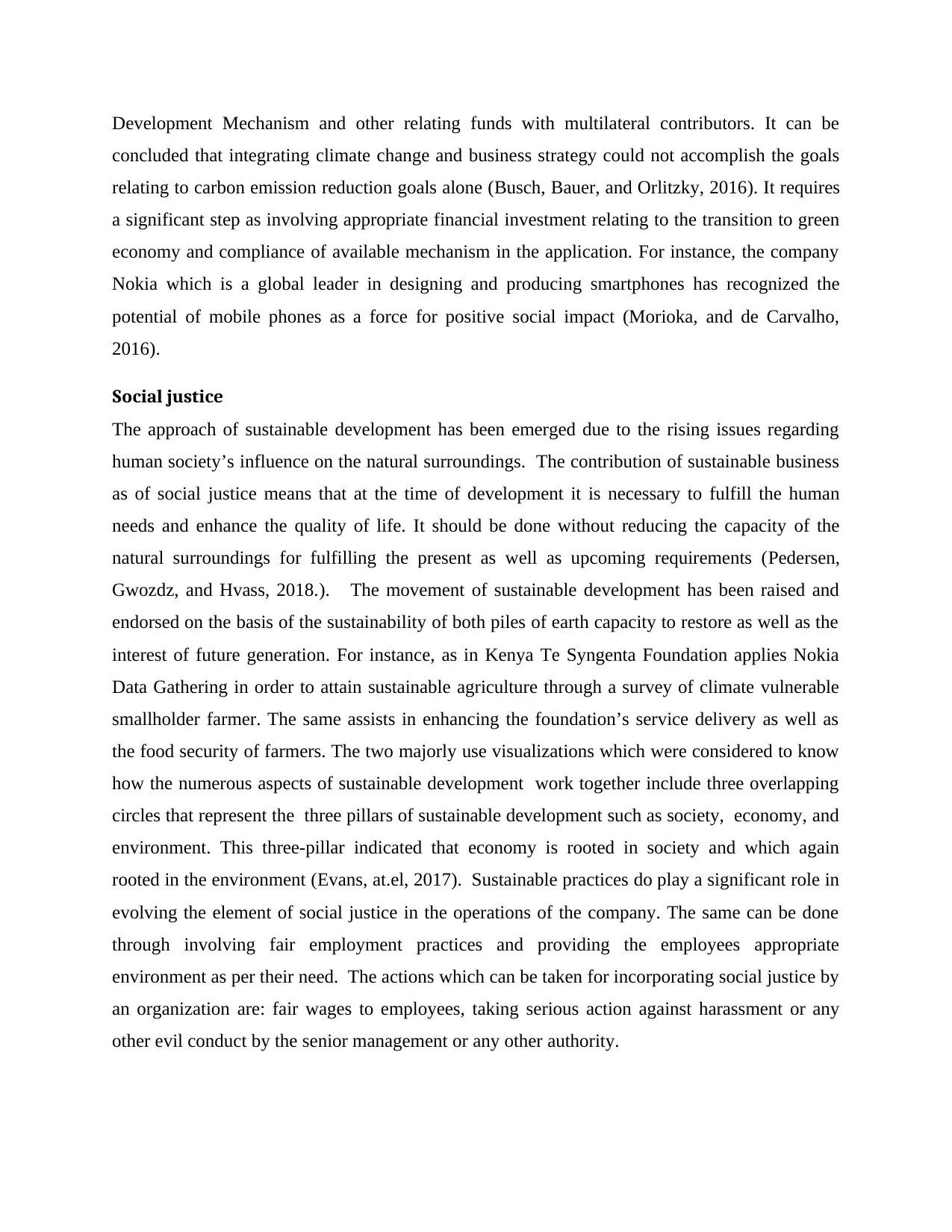
Development Mechanism and other relating funds with multilateral contributors. It can be
concluded that integrating climate change and business strategy could not accomplish the goals
relating to carbon emission reduction goals alone (Busch, Bauer, and Orlitzky, 2016). It requires
a significant step as involving appropriate financial investment relating to the transition to green
economy and compliance of available mechanism in the application. For instance, the company
Nokia which is a global leader in designing and producing smartphones has recognized the
potential of mobile phones as a force for positive social impact (Morioka, and de Carvalho,
2016).
Social justice
The approach of sustainable development has been emerged due to the rising issues regarding
human society’s influence on the natural surroundings. The contribution of sustainable business
as of social justice means that at the time of development it is necessary to fulfill the human
needs and enhance the quality of life. It should be done without reducing the capacity of the
natural surroundings for fulfilling the present as well as upcoming requirements (Pedersen,
Gwozdz, and Hvass, 2018.). The movement of sustainable development has been raised and
endorsed on the basis of the sustainability of both piles of earth capacity to restore as well as the
interest of future generation. For instance, as in Kenya Te Syngenta Foundation applies Nokia
Data Gathering in order to attain sustainable agriculture through a survey of climate vulnerable
smallholder farmer. The same assists in enhancing the foundation’s service delivery as well as
the food security of farmers. The two majorly use visualizations which were considered to know
how the numerous aspects of sustainable development work together include three overlapping
circles that represent the three pillars of sustainable development such as society, economy, and
environment. This three-pillar indicated that economy is rooted in society and which again
rooted in the environment (Evans, at.el, 2017). Sustainable practices do play a significant role in
evolving the element of social justice in the operations of the company. The same can be done
through involving fair employment practices and providing the employees appropriate
environment as per their need. The actions which can be taken for incorporating social justice by
an organization are: fair wages to employees, taking serious action against harassment or any
other evil conduct by the senior management or any other authority.
concluded that integrating climate change and business strategy could not accomplish the goals
relating to carbon emission reduction goals alone (Busch, Bauer, and Orlitzky, 2016). It requires
a significant step as involving appropriate financial investment relating to the transition to green
economy and compliance of available mechanism in the application. For instance, the company
Nokia which is a global leader in designing and producing smartphones has recognized the
potential of mobile phones as a force for positive social impact (Morioka, and de Carvalho,
2016).
Social justice
The approach of sustainable development has been emerged due to the rising issues regarding
human society’s influence on the natural surroundings. The contribution of sustainable business
as of social justice means that at the time of development it is necessary to fulfill the human
needs and enhance the quality of life. It should be done without reducing the capacity of the
natural surroundings for fulfilling the present as well as upcoming requirements (Pedersen,
Gwozdz, and Hvass, 2018.). The movement of sustainable development has been raised and
endorsed on the basis of the sustainability of both piles of earth capacity to restore as well as the
interest of future generation. For instance, as in Kenya Te Syngenta Foundation applies Nokia
Data Gathering in order to attain sustainable agriculture through a survey of climate vulnerable
smallholder farmer. The same assists in enhancing the foundation’s service delivery as well as
the food security of farmers. The two majorly use visualizations which were considered to know
how the numerous aspects of sustainable development work together include three overlapping
circles that represent the three pillars of sustainable development such as society, economy, and
environment. This three-pillar indicated that economy is rooted in society and which again
rooted in the environment (Evans, at.el, 2017). Sustainable practices do play a significant role in
evolving the element of social justice in the operations of the company. The same can be done
through involving fair employment practices and providing the employees appropriate
environment as per their need. The actions which can be taken for incorporating social justice by
an organization are: fair wages to employees, taking serious action against harassment or any
other evil conduct by the senior management or any other authority.
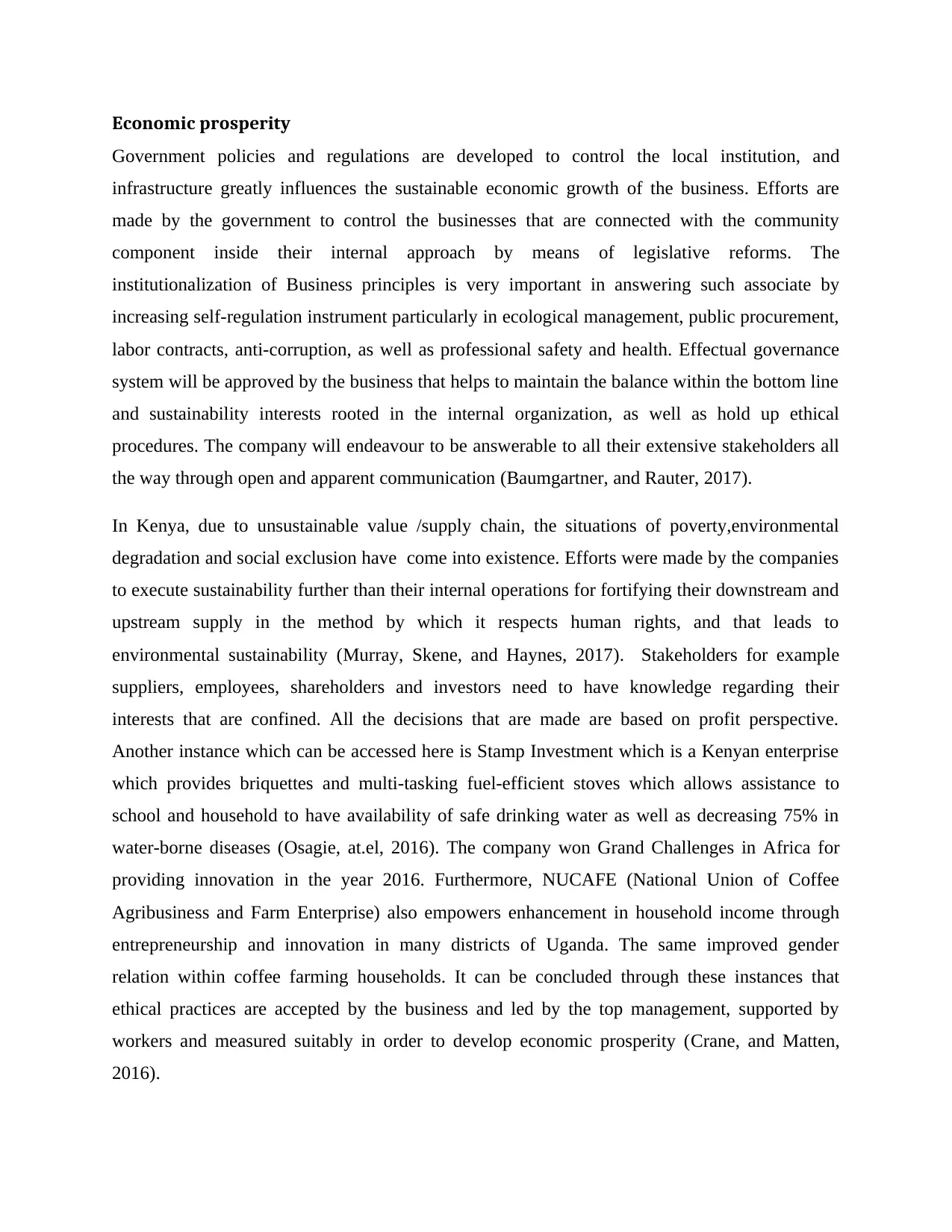
Economic prosperity
Government policies and regulations are developed to control the local institution, and
infrastructure greatly influences the sustainable economic growth of the business. Efforts are
made by the government to control the businesses that are connected with the community
component inside their internal approach by means of legislative reforms. The
institutionalization of Business principles is very important in answering such associate by
increasing self-regulation instrument particularly in ecological management, public procurement,
labor contracts, anti-corruption, as well as professional safety and health. Effectual governance
system will be approved by the business that helps to maintain the balance within the bottom line
and sustainability interests rooted in the internal organization, as well as hold up ethical
procedures. The company will endeavour to be answerable to all their extensive stakeholders all
the way through open and apparent communication (Baumgartner, and Rauter, 2017).
In Kenya, due to unsustainable value /supply chain, the situations of poverty,environmental
degradation and social exclusion have come into existence. Efforts were made by the companies
to execute sustainability further than their internal operations for fortifying their downstream and
upstream supply in the method by which it respects human rights, and that leads to
environmental sustainability (Murray, Skene, and Haynes, 2017). Stakeholders for example
suppliers, employees, shareholders and investors need to have knowledge regarding their
interests that are confined. All the decisions that are made are based on profit perspective.
Another instance which can be accessed here is Stamp Investment which is a Kenyan enterprise
which provides briquettes and multi-tasking fuel-efficient stoves which allows assistance to
school and household to have availability of safe drinking water as well as decreasing 75% in
water-borne diseases (Osagie, at.el, 2016). The company won Grand Challenges in Africa for
providing innovation in the year 2016. Furthermore, NUCAFE (National Union of Coffee
Agribusiness and Farm Enterprise) also empowers enhancement in household income through
entrepreneurship and innovation in many districts of Uganda. The same improved gender
relation within coffee farming households. It can be concluded through these instances that
ethical practices are accepted by the business and led by the top management, supported by
workers and measured suitably in order to develop economic prosperity (Crane, and Matten,
2016).
Government policies and regulations are developed to control the local institution, and
infrastructure greatly influences the sustainable economic growth of the business. Efforts are
made by the government to control the businesses that are connected with the community
component inside their internal approach by means of legislative reforms. The
institutionalization of Business principles is very important in answering such associate by
increasing self-regulation instrument particularly in ecological management, public procurement,
labor contracts, anti-corruption, as well as professional safety and health. Effectual governance
system will be approved by the business that helps to maintain the balance within the bottom line
and sustainability interests rooted in the internal organization, as well as hold up ethical
procedures. The company will endeavour to be answerable to all their extensive stakeholders all
the way through open and apparent communication (Baumgartner, and Rauter, 2017).
In Kenya, due to unsustainable value /supply chain, the situations of poverty,environmental
degradation and social exclusion have come into existence. Efforts were made by the companies
to execute sustainability further than their internal operations for fortifying their downstream and
upstream supply in the method by which it respects human rights, and that leads to
environmental sustainability (Murray, Skene, and Haynes, 2017). Stakeholders for example
suppliers, employees, shareholders and investors need to have knowledge regarding their
interests that are confined. All the decisions that are made are based on profit perspective.
Another instance which can be accessed here is Stamp Investment which is a Kenyan enterprise
which provides briquettes and multi-tasking fuel-efficient stoves which allows assistance to
school and household to have availability of safe drinking water as well as decreasing 75% in
water-borne diseases (Osagie, at.el, 2016). The company won Grand Challenges in Africa for
providing innovation in the year 2016. Furthermore, NUCAFE (National Union of Coffee
Agribusiness and Farm Enterprise) also empowers enhancement in household income through
entrepreneurship and innovation in many districts of Uganda. The same improved gender
relation within coffee farming households. It can be concluded through these instances that
ethical practices are accepted by the business and led by the top management, supported by
workers and measured suitably in order to develop economic prosperity (Crane, and Matten,
2016).
⊘ This is a preview!⊘
Do you want full access?
Subscribe today to unlock all pages.

Trusted by 1+ million students worldwide
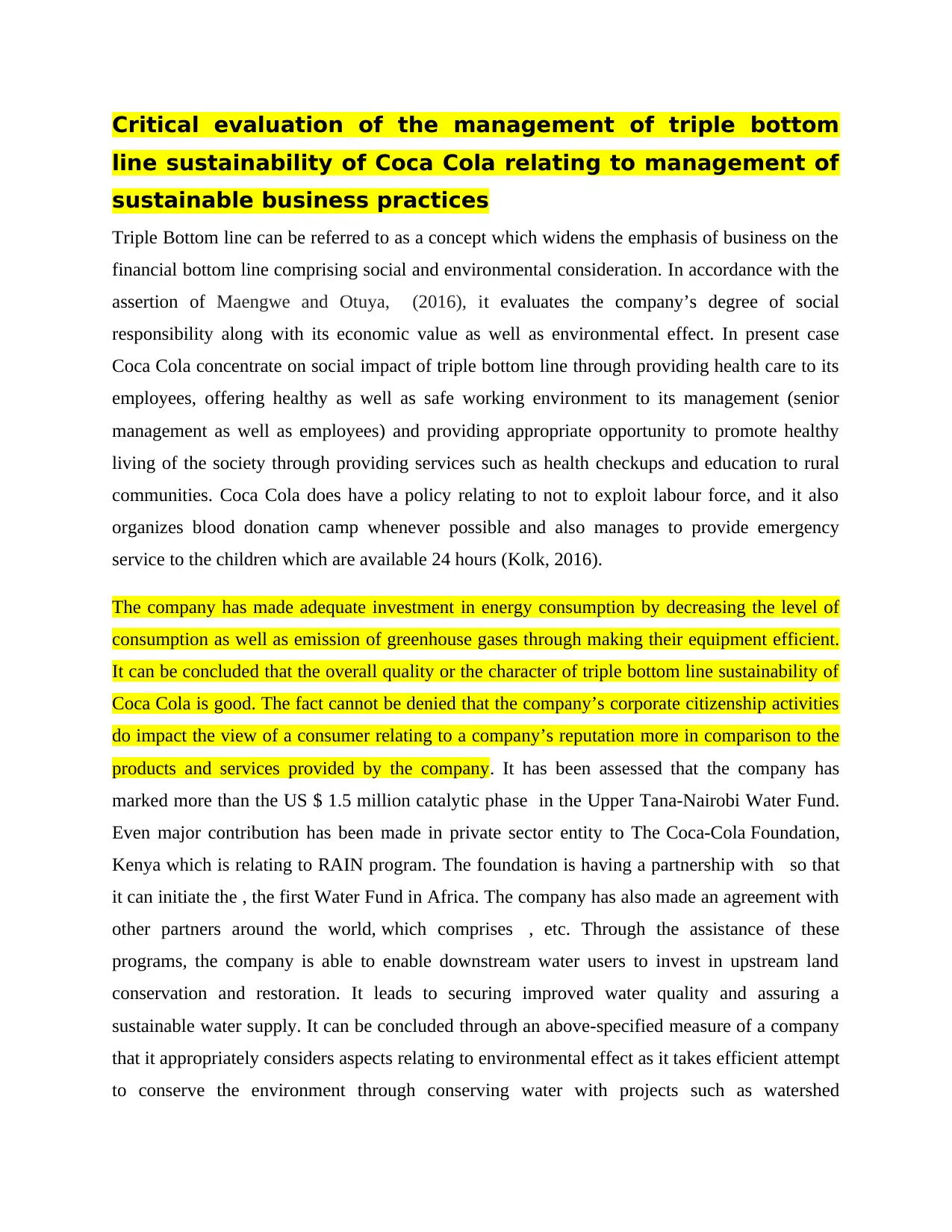
Critical evaluation of the management of triple bottom
line sustainability of Coca Cola relating to management of
sustainable business practices
Triple Bottom line can be referred to as a concept which widens the emphasis of business on the
financial bottom line comprising social and environmental consideration. In accordance with the
assertion of Maengwe and Otuya, (2016), it evaluates the company’s degree of social
responsibility along with its economic value as well as environmental effect. In present case
Coca Cola concentrate on social impact of triple bottom line through providing health care to its
employees, offering healthy as well as safe working environment to its management (senior
management as well as employees) and providing appropriate opportunity to promote healthy
living of the society through providing services such as health checkups and education to rural
communities. Coca Cola does have a policy relating to not to exploit labour force, and it also
organizes blood donation camp whenever possible and also manages to provide emergency
service to the children which are available 24 hours (Kolk, 2016).
The company has made adequate investment in energy consumption by decreasing the level of
consumption as well as emission of greenhouse gases through making their equipment efficient.
It can be concluded that the overall quality or the character of triple bottom line sustainability of
Coca Cola is good. The fact cannot be denied that the company’s corporate citizenship activities
do impact the view of a consumer relating to a company’s reputation more in comparison to the
products and services provided by the company. It has been assessed that the company has
marked more than the US $ 1.5 million catalytic phase in the Upper Tana-Nairobi Water Fund.
Even major contribution has been made in private sector entity to The Coca-Cola Foundation,
Kenya which is relating to RAIN program. The foundation is having a partnership with so that
it can initiate the , the first Water Fund in Africa. The company has also made an agreement with
other partners around the world, which comprises , etc. Through the assistance of these
programs, the company is able to enable downstream water users to invest in upstream land
conservation and restoration. It leads to securing improved water quality and assuring a
sustainable water supply. It can be concluded through an above-specified measure of a company
that it appropriately considers aspects relating to environmental effect as it takes efficient attempt
to conserve the environment through conserving water with projects such as watershed
line sustainability of Coca Cola relating to management of
sustainable business practices
Triple Bottom line can be referred to as a concept which widens the emphasis of business on the
financial bottom line comprising social and environmental consideration. In accordance with the
assertion of Maengwe and Otuya, (2016), it evaluates the company’s degree of social
responsibility along with its economic value as well as environmental effect. In present case
Coca Cola concentrate on social impact of triple bottom line through providing health care to its
employees, offering healthy as well as safe working environment to its management (senior
management as well as employees) and providing appropriate opportunity to promote healthy
living of the society through providing services such as health checkups and education to rural
communities. Coca Cola does have a policy relating to not to exploit labour force, and it also
organizes blood donation camp whenever possible and also manages to provide emergency
service to the children which are available 24 hours (Kolk, 2016).
The company has made adequate investment in energy consumption by decreasing the level of
consumption as well as emission of greenhouse gases through making their equipment efficient.
It can be concluded that the overall quality or the character of triple bottom line sustainability of
Coca Cola is good. The fact cannot be denied that the company’s corporate citizenship activities
do impact the view of a consumer relating to a company’s reputation more in comparison to the
products and services provided by the company. It has been assessed that the company has
marked more than the US $ 1.5 million catalytic phase in the Upper Tana-Nairobi Water Fund.
Even major contribution has been made in private sector entity to The Coca-Cola Foundation,
Kenya which is relating to RAIN program. The foundation is having a partnership with so that
it can initiate the , the first Water Fund in Africa. The company has also made an agreement with
other partners around the world, which comprises , etc. Through the assistance of these
programs, the company is able to enable downstream water users to invest in upstream land
conservation and restoration. It leads to securing improved water quality and assuring a
sustainable water supply. It can be concluded through an above-specified measure of a company
that it appropriately considers aspects relating to environmental effect as it takes efficient attempt
to conserve the environment through conserving water with projects such as watershed
Paraphrase This Document
Need a fresh take? Get an instant paraphrase of this document with our AI Paraphraser
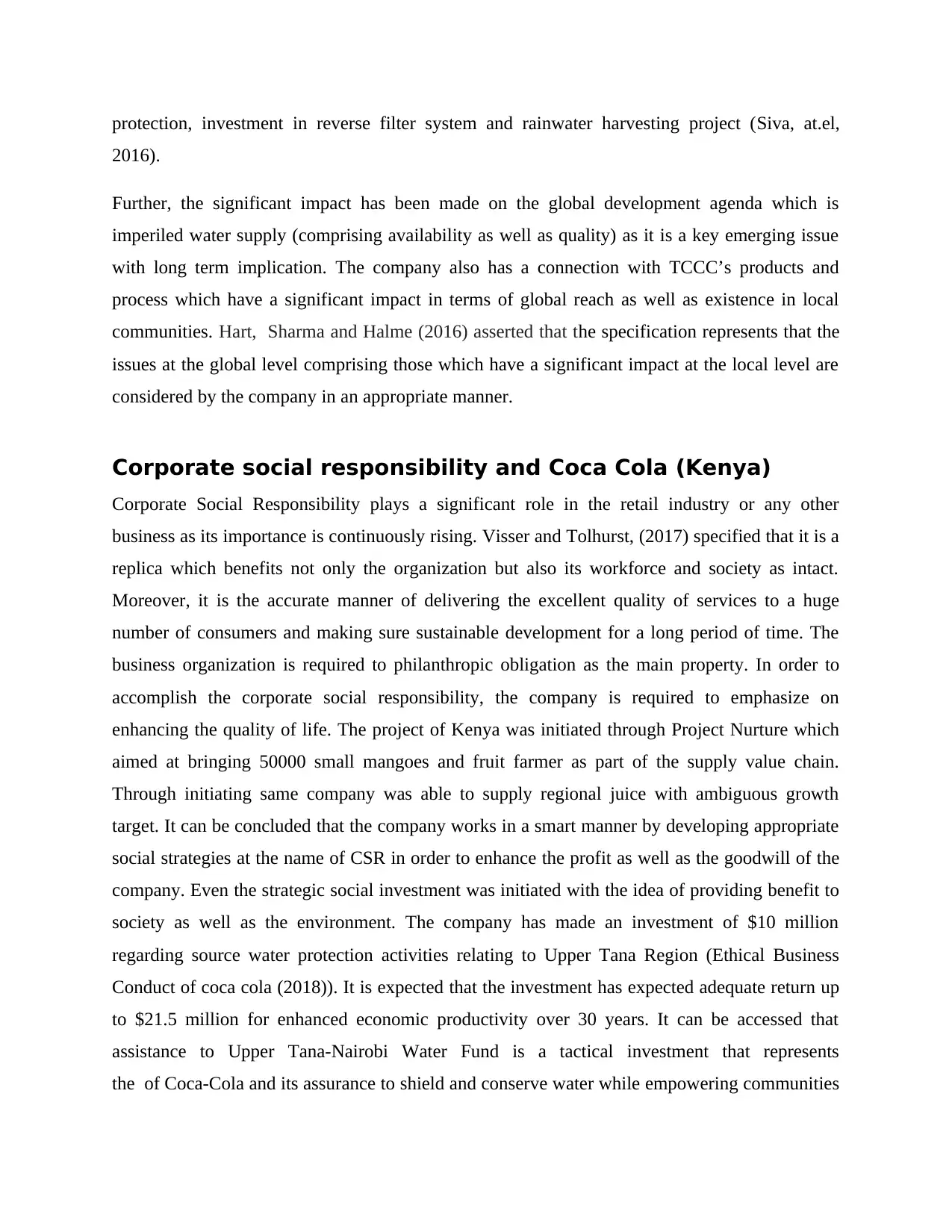
protection, investment in reverse filter system and rainwater harvesting project (Siva, at.el,
2016).
Further, the significant impact has been made on the global development agenda which is
imperiled water supply (comprising availability as well as quality) as it is a key emerging issue
with long term implication. The company also has a connection with TCCC’s products and
process which have a significant impact in terms of global reach as well as existence in local
communities. Hart, Sharma and Halme (2016) asserted that the specification represents that the
issues at the global level comprising those which have a significant impact at the local level are
considered by the company in an appropriate manner.
Corporate social responsibility and Coca Cola (Kenya)
Corporate Social Responsibility plays a significant role in the retail industry or any other
business as its importance is continuously rising. Visser and Tolhurst, (2017) specified that it is a
replica which benefits not only the organization but also its workforce and society as intact.
Moreover, it is the accurate manner of delivering the excellent quality of services to a huge
number of consumers and making sure sustainable development for a long period of time. The
business organization is required to philanthropic obligation as the main property. In order to
accomplish the corporate social responsibility, the company is required to emphasize on
enhancing the quality of life. The project of Kenya was initiated through Project Nurture which
aimed at bringing 50000 small mangoes and fruit farmer as part of the supply value chain.
Through initiating same company was able to supply regional juice with ambiguous growth
target. It can be concluded that the company works in a smart manner by developing appropriate
social strategies at the name of CSR in order to enhance the profit as well as the goodwill of the
company. Even the strategic social investment was initiated with the idea of providing benefit to
society as well as the environment. The company has made an investment of $10 million
regarding source water protection activities relating to Upper Tana Region (Ethical Business
Conduct of coca cola (2018)). It is expected that the investment has expected adequate return up
to $21.5 million for enhanced economic productivity over 30 years. It can be accessed that
assistance to Upper Tana-Nairobi Water Fund is a tactical investment that represents
the of Coca-Cola and its assurance to shield and conserve water while empowering communities
2016).
Further, the significant impact has been made on the global development agenda which is
imperiled water supply (comprising availability as well as quality) as it is a key emerging issue
with long term implication. The company also has a connection with TCCC’s products and
process which have a significant impact in terms of global reach as well as existence in local
communities. Hart, Sharma and Halme (2016) asserted that the specification represents that the
issues at the global level comprising those which have a significant impact at the local level are
considered by the company in an appropriate manner.
Corporate social responsibility and Coca Cola (Kenya)
Corporate Social Responsibility plays a significant role in the retail industry or any other
business as its importance is continuously rising. Visser and Tolhurst, (2017) specified that it is a
replica which benefits not only the organization but also its workforce and society as intact.
Moreover, it is the accurate manner of delivering the excellent quality of services to a huge
number of consumers and making sure sustainable development for a long period of time. The
business organization is required to philanthropic obligation as the main property. In order to
accomplish the corporate social responsibility, the company is required to emphasize on
enhancing the quality of life. The project of Kenya was initiated through Project Nurture which
aimed at bringing 50000 small mangoes and fruit farmer as part of the supply value chain.
Through initiating same company was able to supply regional juice with ambiguous growth
target. It can be concluded that the company works in a smart manner by developing appropriate
social strategies at the name of CSR in order to enhance the profit as well as the goodwill of the
company. Even the strategic social investment was initiated with the idea of providing benefit to
society as well as the environment. The company has made an investment of $10 million
regarding source water protection activities relating to Upper Tana Region (Ethical Business
Conduct of coca cola (2018)). It is expected that the investment has expected adequate return up
to $21.5 million for enhanced economic productivity over 30 years. It can be accessed that
assistance to Upper Tana-Nairobi Water Fund is a tactical investment that represents
the of Coca-Cola and its assurance to shield and conserve water while empowering communities
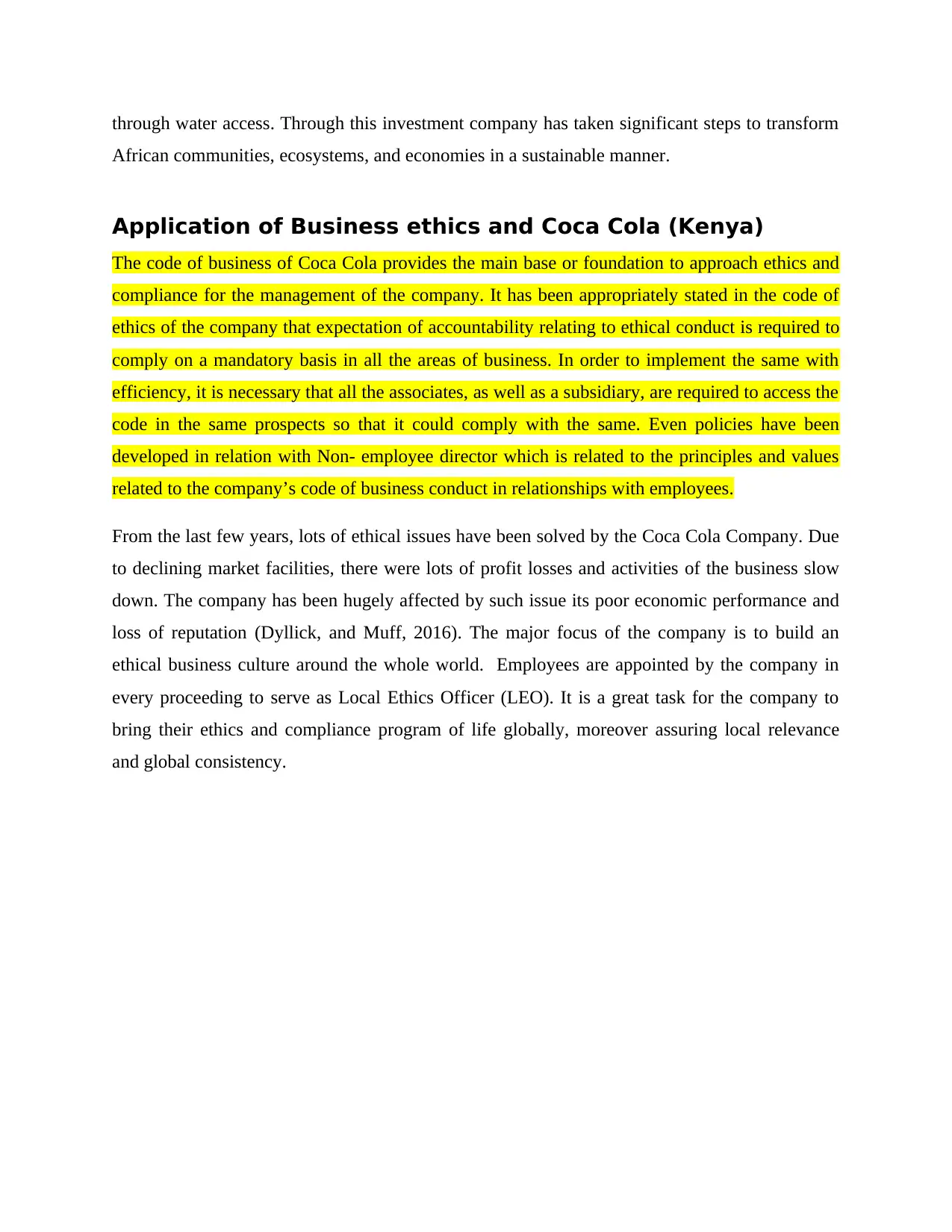
through water access. Through this investment company has taken significant steps to transform
African communities, ecosystems, and economies in a sustainable manner.
Application of Business ethics and Coca Cola (Kenya)
The code of business of Coca Cola provides the main base or foundation to approach ethics and
compliance for the management of the company. It has been appropriately stated in the code of
ethics of the company that expectation of accountability relating to ethical conduct is required to
comply on a mandatory basis in all the areas of business. In order to implement the same with
efficiency, it is necessary that all the associates, as well as a subsidiary, are required to access the
code in the same prospects so that it could comply with the same. Even policies have been
developed in relation with Non- employee director which is related to the principles and values
related to the company’s code of business conduct in relationships with employees.
From the last few years, lots of ethical issues have been solved by the Coca Cola Company. Due
to declining market facilities, there were lots of profit losses and activities of the business slow
down. The company has been hugely affected by such issue its poor economic performance and
loss of reputation (Dyllick, and Muff, 2016). The major focus of the company is to build an
ethical business culture around the whole world. Employees are appointed by the company in
every proceeding to serve as Local Ethics Officer (LEO). It is a great task for the company to
bring their ethics and compliance program of life globally, moreover assuring local relevance
and global consistency.
African communities, ecosystems, and economies in a sustainable manner.
Application of Business ethics and Coca Cola (Kenya)
The code of business of Coca Cola provides the main base or foundation to approach ethics and
compliance for the management of the company. It has been appropriately stated in the code of
ethics of the company that expectation of accountability relating to ethical conduct is required to
comply on a mandatory basis in all the areas of business. In order to implement the same with
efficiency, it is necessary that all the associates, as well as a subsidiary, are required to access the
code in the same prospects so that it could comply with the same. Even policies have been
developed in relation with Non- employee director which is related to the principles and values
related to the company’s code of business conduct in relationships with employees.
From the last few years, lots of ethical issues have been solved by the Coca Cola Company. Due
to declining market facilities, there were lots of profit losses and activities of the business slow
down. The company has been hugely affected by such issue its poor economic performance and
loss of reputation (Dyllick, and Muff, 2016). The major focus of the company is to build an
ethical business culture around the whole world. Employees are appointed by the company in
every proceeding to serve as Local Ethics Officer (LEO). It is a great task for the company to
bring their ethics and compliance program of life globally, moreover assuring local relevance
and global consistency.
⊘ This is a preview!⊘
Do you want full access?
Subscribe today to unlock all pages.

Trusted by 1+ million students worldwide
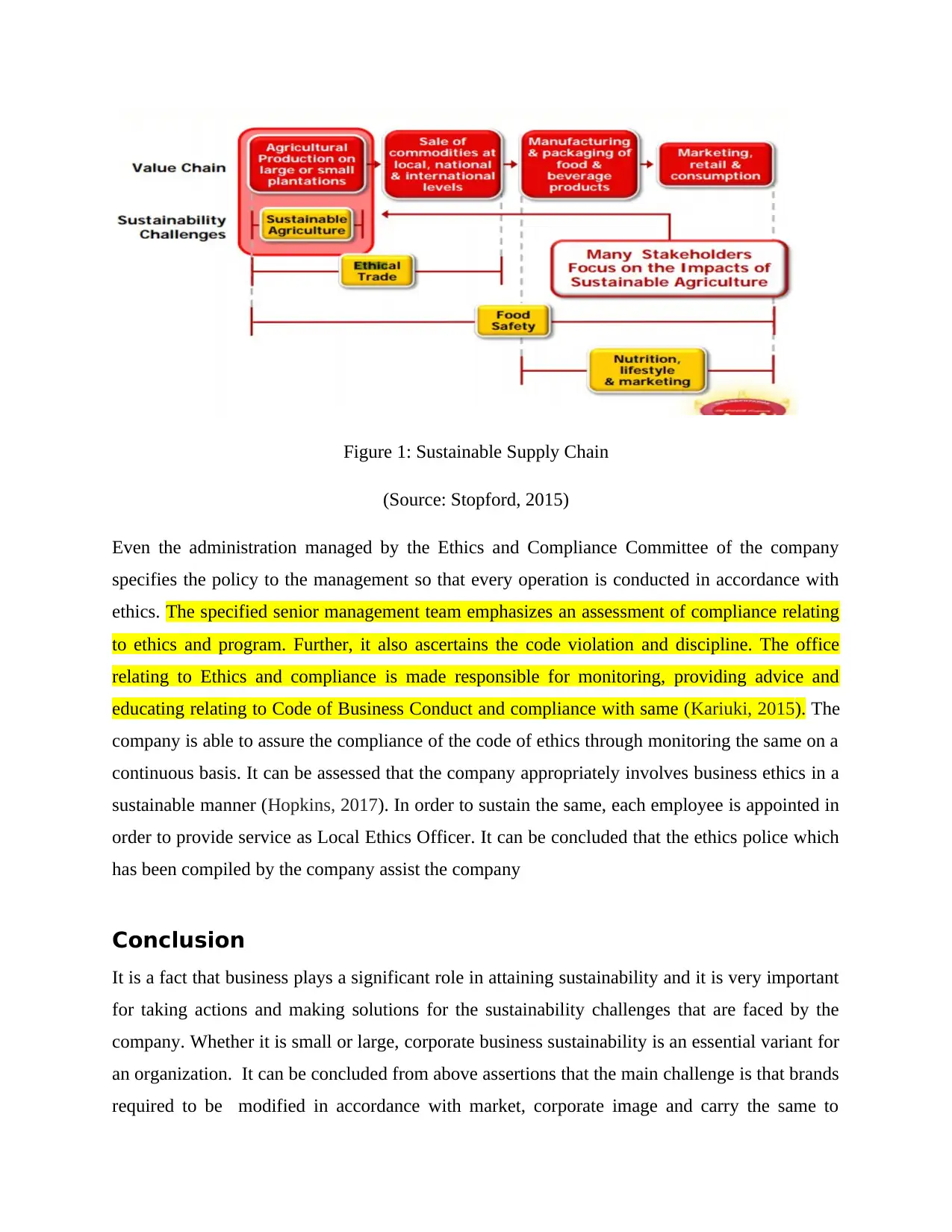
Figure 1: Sustainable Supply Chain
(Source: Stopford, 2015)
Even the administration managed by the Ethics and Compliance Committee of the company
specifies the policy to the management so that every operation is conducted in accordance with
ethics. The specified senior management team emphasizes an assessment of compliance relating
to ethics and program. Further, it also ascertains the code violation and discipline. The office
relating to Ethics and compliance is made responsible for monitoring, providing advice and
educating relating to Code of Business Conduct and compliance with same (Kariuki, 2015). The
company is able to assure the compliance of the code of ethics through monitoring the same on a
continuous basis. It can be assessed that the company appropriately involves business ethics in a
sustainable manner (Hopkins, 2017). In order to sustain the same, each employee is appointed in
order to provide service as Local Ethics Officer. It can be concluded that the ethics police which
has been compiled by the company assist the company
Conclusion
It is a fact that business plays a significant role in attaining sustainability and it is very important
for taking actions and making solutions for the sustainability challenges that are faced by the
company. Whether it is small or large, corporate business sustainability is an essential variant for
an organization. It can be concluded from above assertions that the main challenge is that brands
required to be modified in accordance with market, corporate image and carry the same to
(Source: Stopford, 2015)
Even the administration managed by the Ethics and Compliance Committee of the company
specifies the policy to the management so that every operation is conducted in accordance with
ethics. The specified senior management team emphasizes an assessment of compliance relating
to ethics and program. Further, it also ascertains the code violation and discipline. The office
relating to Ethics and compliance is made responsible for monitoring, providing advice and
educating relating to Code of Business Conduct and compliance with same (Kariuki, 2015). The
company is able to assure the compliance of the code of ethics through monitoring the same on a
continuous basis. It can be assessed that the company appropriately involves business ethics in a
sustainable manner (Hopkins, 2017). In order to sustain the same, each employee is appointed in
order to provide service as Local Ethics Officer. It can be concluded that the ethics police which
has been compiled by the company assist the company
Conclusion
It is a fact that business plays a significant role in attaining sustainability and it is very important
for taking actions and making solutions for the sustainability challenges that are faced by the
company. Whether it is small or large, corporate business sustainability is an essential variant for
an organization. It can be concluded from above assertions that the main challenge is that brands
required to be modified in accordance with market, corporate image and carry the same to
Paraphrase This Document
Need a fresh take? Get an instant paraphrase of this document with our AI Paraphraser
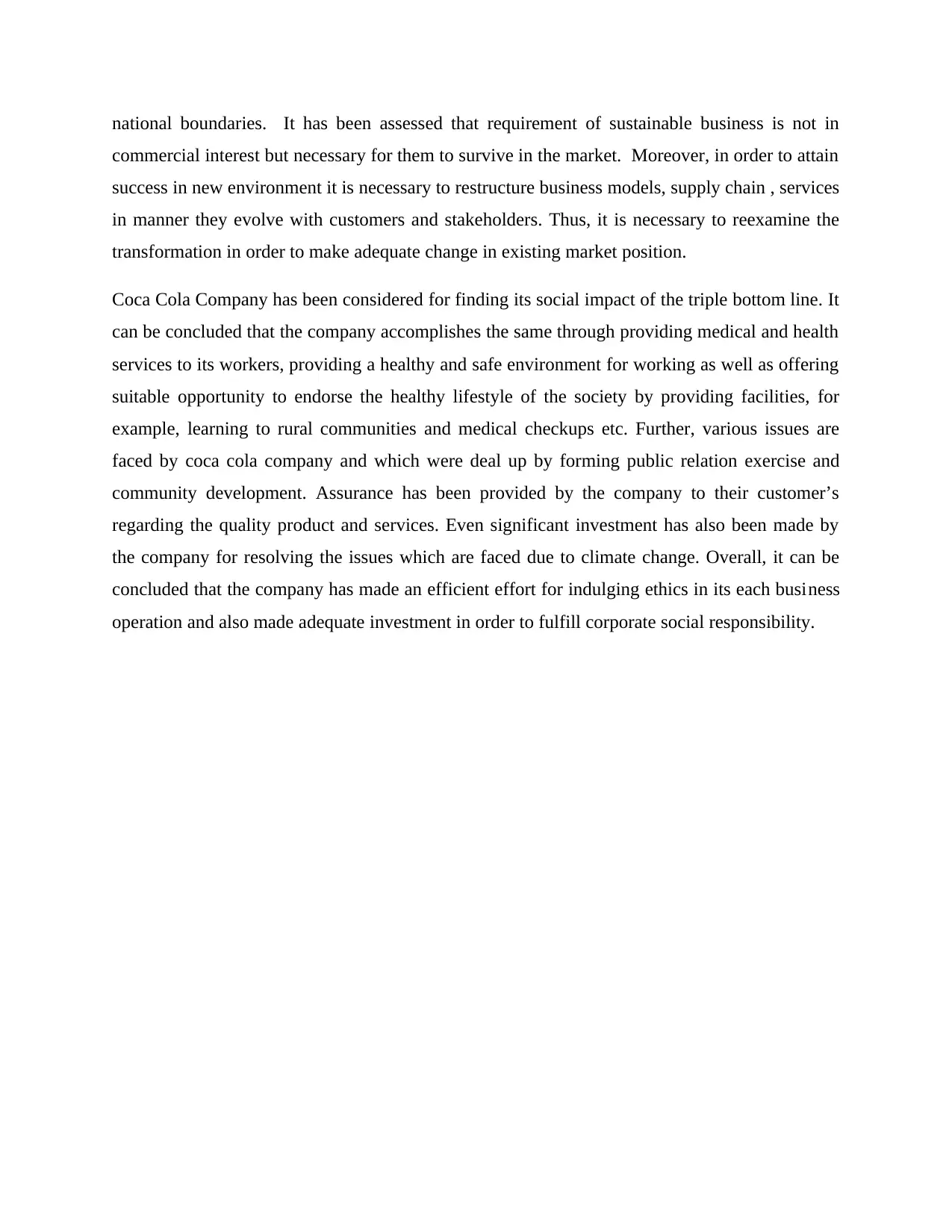
national boundaries. It has been assessed that requirement of sustainable business is not in
commercial interest but necessary for them to survive in the market. Moreover, in order to attain
success in new environment it is necessary to restructure business models, supply chain , services
in manner they evolve with customers and stakeholders. Thus, it is necessary to reexamine the
transformation in order to make adequate change in existing market position.
Coca Cola Company has been considered for finding its social impact of the triple bottom line. It
can be concluded that the company accomplishes the same through providing medical and health
services to its workers, providing a healthy and safe environment for working as well as offering
suitable opportunity to endorse the healthy lifestyle of the society by providing facilities, for
example, learning to rural communities and medical checkups etc. Further, various issues are
faced by coca cola company and which were deal up by forming public relation exercise and
community development. Assurance has been provided by the company to their customer’s
regarding the quality product and services. Even significant investment has also been made by
the company for resolving the issues which are faced due to climate change. Overall, it can be
concluded that the company has made an efficient effort for indulging ethics in its each business
operation and also made adequate investment in order to fulfill corporate social responsibility.
commercial interest but necessary for them to survive in the market. Moreover, in order to attain
success in new environment it is necessary to restructure business models, supply chain , services
in manner they evolve with customers and stakeholders. Thus, it is necessary to reexamine the
transformation in order to make adequate change in existing market position.
Coca Cola Company has been considered for finding its social impact of the triple bottom line. It
can be concluded that the company accomplishes the same through providing medical and health
services to its workers, providing a healthy and safe environment for working as well as offering
suitable opportunity to endorse the healthy lifestyle of the society by providing facilities, for
example, learning to rural communities and medical checkups etc. Further, various issues are
faced by coca cola company and which were deal up by forming public relation exercise and
community development. Assurance has been provided by the company to their customer’s
regarding the quality product and services. Even significant investment has also been made by
the company for resolving the issues which are faced due to climate change. Overall, it can be
concluded that the company has made an efficient effort for indulging ethics in its each business
operation and also made adequate investment in order to fulfill corporate social responsibility.
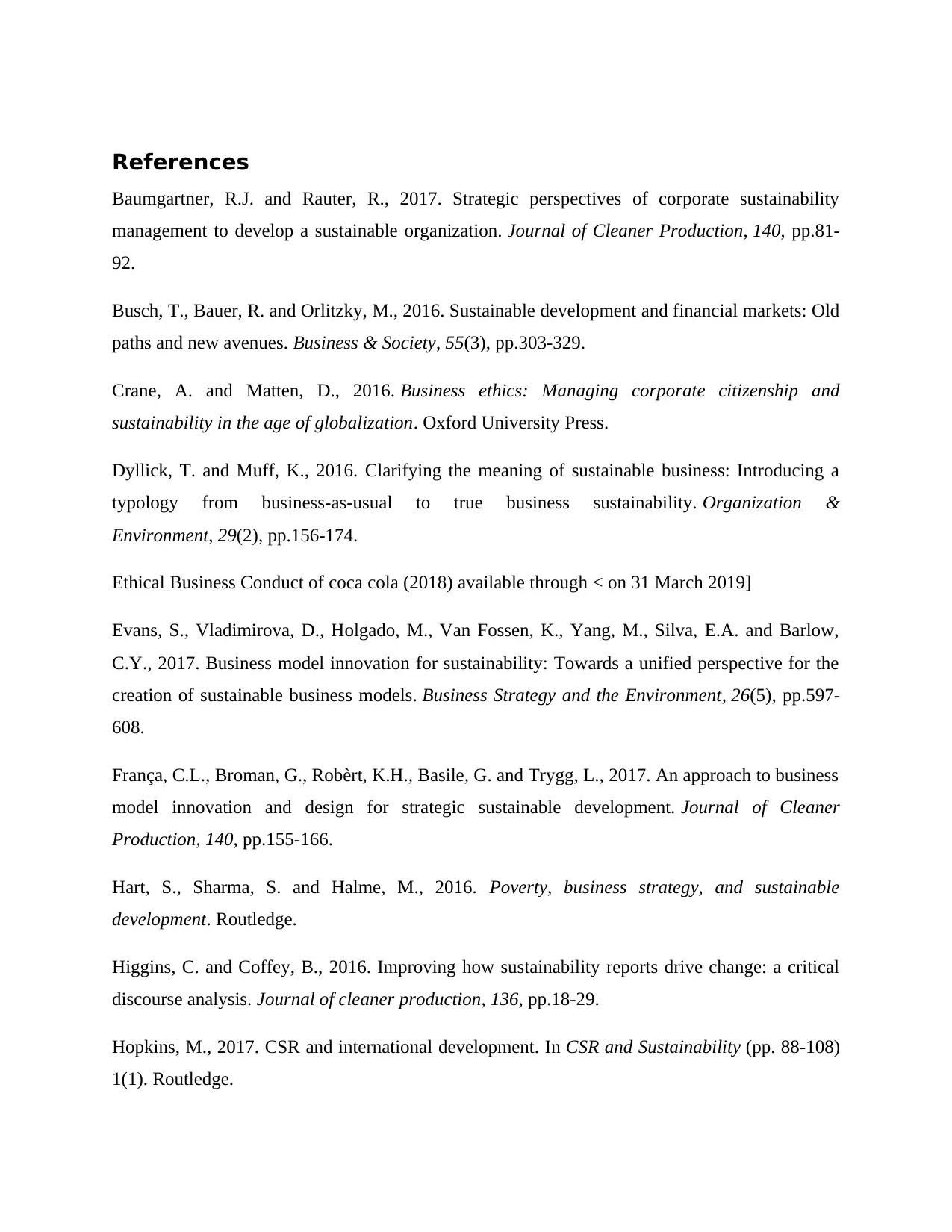
References
Baumgartner, R.J. and Rauter, R., 2017. Strategic perspectives of corporate sustainability
management to develop a sustainable organization. Journal of Cleaner Production, 140, pp.81-
92.
Busch, T., Bauer, R. and Orlitzky, M., 2016. Sustainable development and financial markets: Old
paths and new avenues. Business & Society, 55(3), pp.303-329.
Crane, A. and Matten, D., 2016. Business ethics: Managing corporate citizenship and
sustainability in the age of globalization. Oxford University Press.
Dyllick, T. and Muff, K., 2016. Clarifying the meaning of sustainable business: Introducing a
typology from business-as-usual to true business sustainability. Organization &
Environment, 29(2), pp.156-174.
Ethical Business Conduct of coca cola (2018) available through < on 31 March 2019]
Evans, S., Vladimirova, D., Holgado, M., Van Fossen, K., Yang, M., Silva, E.A. and Barlow,
C.Y., 2017. Business model innovation for sustainability: Towards a unified perspective for the
creation of sustainable business models. Business Strategy and the Environment, 26(5), pp.597-
608.
França, C.L., Broman, G., Robèrt, K.H., Basile, G. and Trygg, L., 2017. An approach to business
model innovation and design for strategic sustainable development. Journal of Cleaner
Production, 140, pp.155-166.
Hart, S., Sharma, S. and Halme, M., 2016. Poverty, business strategy, and sustainable
development. Routledge.
Higgins, C. and Coffey, B., 2016. Improving how sustainability reports drive change: a critical
discourse analysis. Journal of cleaner production, 136, pp.18-29.
Hopkins, M., 2017. CSR and international development. In CSR and Sustainability (pp. 88-108)
1(1). Routledge.
Baumgartner, R.J. and Rauter, R., 2017. Strategic perspectives of corporate sustainability
management to develop a sustainable organization. Journal of Cleaner Production, 140, pp.81-
92.
Busch, T., Bauer, R. and Orlitzky, M., 2016. Sustainable development and financial markets: Old
paths and new avenues. Business & Society, 55(3), pp.303-329.
Crane, A. and Matten, D., 2016. Business ethics: Managing corporate citizenship and
sustainability in the age of globalization. Oxford University Press.
Dyllick, T. and Muff, K., 2016. Clarifying the meaning of sustainable business: Introducing a
typology from business-as-usual to true business sustainability. Organization &
Environment, 29(2), pp.156-174.
Ethical Business Conduct of coca cola (2018) available through < on 31 March 2019]
Evans, S., Vladimirova, D., Holgado, M., Van Fossen, K., Yang, M., Silva, E.A. and Barlow,
C.Y., 2017. Business model innovation for sustainability: Towards a unified perspective for the
creation of sustainable business models. Business Strategy and the Environment, 26(5), pp.597-
608.
França, C.L., Broman, G., Robèrt, K.H., Basile, G. and Trygg, L., 2017. An approach to business
model innovation and design for strategic sustainable development. Journal of Cleaner
Production, 140, pp.155-166.
Hart, S., Sharma, S. and Halme, M., 2016. Poverty, business strategy, and sustainable
development. Routledge.
Higgins, C. and Coffey, B., 2016. Improving how sustainability reports drive change: a critical
discourse analysis. Journal of cleaner production, 136, pp.18-29.
Hopkins, M., 2017. CSR and international development. In CSR and Sustainability (pp. 88-108)
1(1). Routledge.
⊘ This is a preview!⊘
Do you want full access?
Subscribe today to unlock all pages.

Trusted by 1+ million students worldwide
1 out of 14
Related Documents
Your All-in-One AI-Powered Toolkit for Academic Success.
+13062052269
info@desklib.com
Available 24*7 on WhatsApp / Email
![[object Object]](/_next/static/media/star-bottom.7253800d.svg)
Unlock your academic potential
Copyright © 2020–2026 A2Z Services. All Rights Reserved. Developed and managed by ZUCOL.



